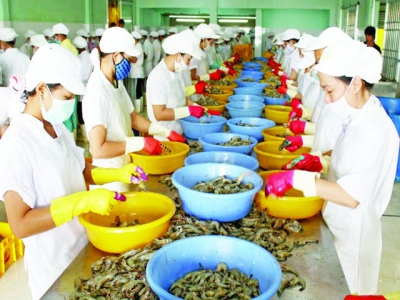Efforts underway to reopen EU to Vietnamese seafood

Experts believe adherence to the EU’s regulations on combatting illegal, unreported and unregulated (IUU) fishing will reopen the bloc’s market to Vietnamese seafood.
Seafood exports to the EU have declined considerably since the IUU yellow card was issued
Damages
A report by the Vietnam Association of Seafood Exporters and Producers (VASEP) shows that the European Commission (EC) decision to impose an IUU yellow card on Vietnam’s fisheries has hindered Vietnamese seafood exports to the EU, leading to a 15-30 percent drop in the export value to this market.
According to Le Hang, Deputy Director of the VASEP Training and Trade Promotion Center (VASEP.PRO), in the first eight months of 2018, seafood exports to the EU reached US$250 million, down 25 percent compared with the same period last year. “The export of cuttlefish, octopus, crabs and sea fish to the EU is forecast to continue plunging due to difficulties in seeking certification of the legality of fishing activities,” she said at a recent workshop held by VASEP to review efforts to combat IUU fishing over the past year.
Nguyen Thi Thu Sac, Chairwoman of the VASEP Marine Product Committee, said getting seafood exports back on track depends on the reform of Vietnam’s fisheries. In her opinion, the state needs to impose strict sanctions on illegal fishing activities.
Business efforts
According to Le Hang, prior to the issuance of the yellow card, on September 25, 2017, VASEP launched a program to combat IUU fishing, with voluntary participation of seafood processing, import and export companies.
The program has been implemented for over a year, adding regional and global regulations to combat IUU fishing to the 2017 Law on Fisheries and legal documents guiding the implementation of this law. Public information campaigns about the fight against IUU fishing have been intensified, improving the awareness of fishery management authorities from central to local levels, the fishermen community and seafood businesses. Violations of the territorial waters of countries in the Pacific region have been prevented and fishing inspections have shown improvements.
To help business persuade the EC to remove the yellow card, VASEP will coordinate with local departments of fisheries and fishing ports to trace the origin of each batch of seafood. At the same time, the association will assist seafood companies in purchasing materials from fishing boats. VASEP will also ask the Ministry of Agriculture and Rural Development to apply the one-stop mechanism in inspection activities from fishing ports to fisheries departments. A database will be created to reduce the time required to complete procedures related to tracing the origin of seafood products.
The EC will send a delegation to Vietnam next January to see how Vietnamese seafood companies are implementing the EC’s recommendations and consider removing the yellow card.
Có thể bạn quan tâm
Phần mềm

Phối trộn thức ăn chăn nuôi

Pha dung dịch thủy canh

Định mức cho tôm ăn

Phối trộn phân bón NPK

Xác định tỷ lệ tôm sống

Chuyển đổi đơn vị phân bón

Xác định công suất sục khí

Chuyển đổi đơn vị tôm

Tính diện tích nhà kính

Tính thể tích ao hồ




 Vietnam poised to become top player in ocean…
Vietnam poised to become top player in ocean…  Russia’s aquaculture industry brimming with potential
Russia’s aquaculture industry brimming with potential